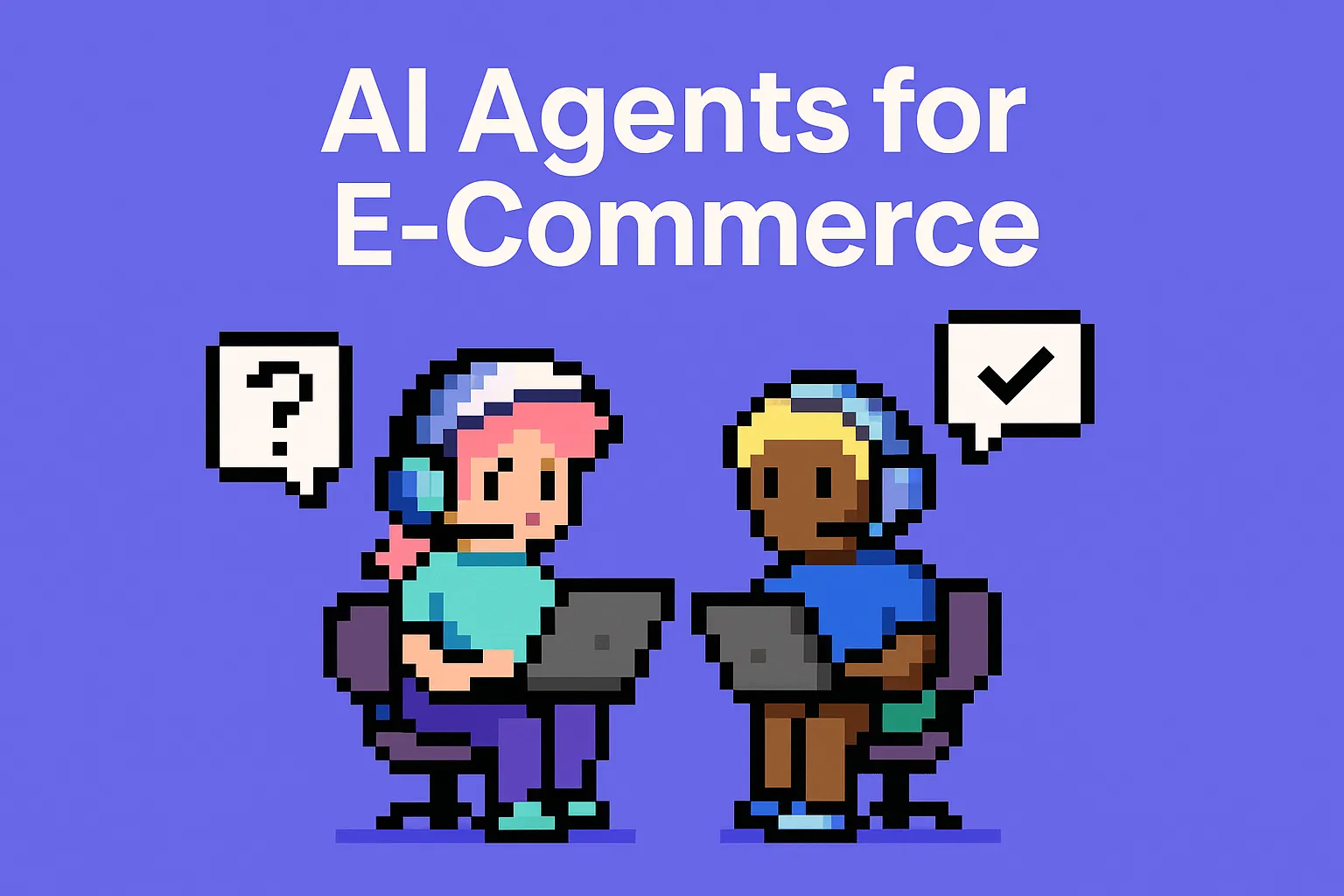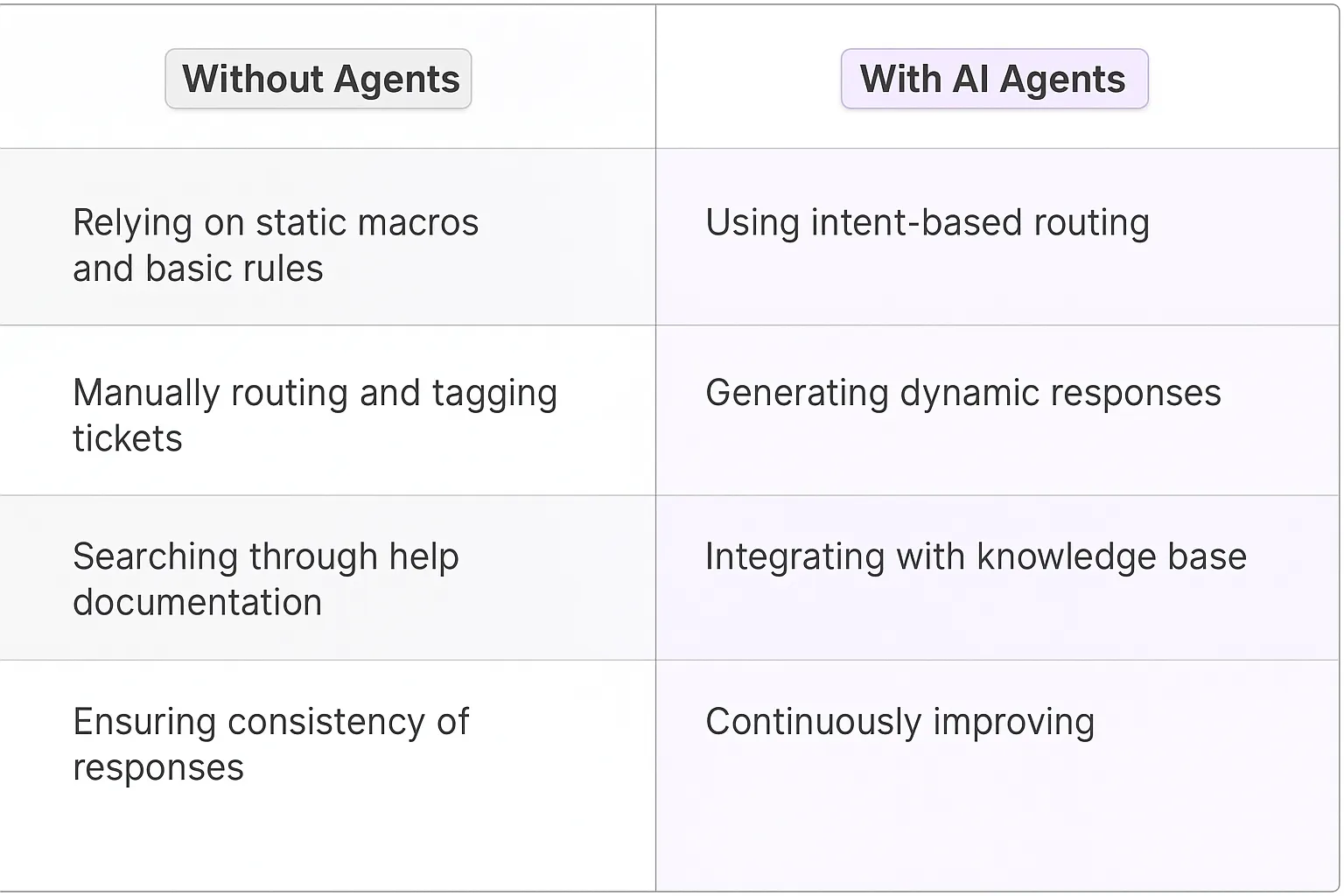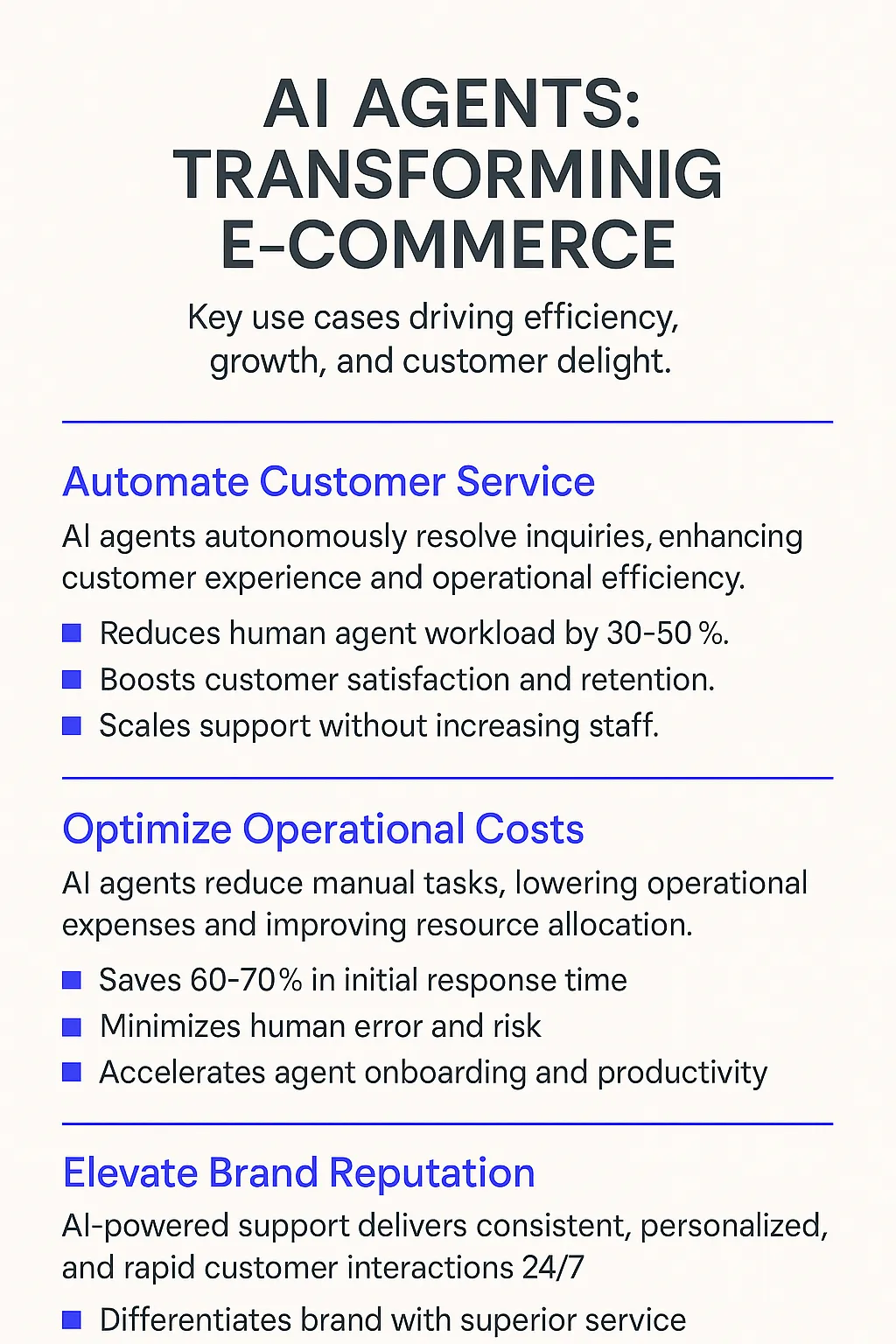Gorgias
Understanding Gorgias: The E-commerce Help Desk Platform
Gorgias stands out as a specialized e-commerce help desk platform that centralizes customer communications across multiple channels. The platform combines order management, customer service tools, and automation capabilities to help online retailers deliver exceptional support experiences. With its deep Shopify integration and focus on e-commerce-specific workflows, Gorgias has become the go-to solution for growing direct-to-consumer brands.
Key Features of Gorgias
- Centralized inbox for managing customer communications across email, social media, and chat
- Deep e-commerce integration showing customer order history and details within tickets
- Customizable macros and automation rules for common customer scenarios
- Built-in social media engagement tools
- Advanced analytics and reporting capabilities
- Integration with major e-commerce platforms and tools

Benefits of AI Agents for Gorgias
What would have been used before AI Agents?
Customer service teams using Gorgias previously relied on static macros, basic automation rules, and manual ticket routing. Support agents spent countless hours writing repetitive responses, categorizing tickets, and searching through help documentation. The process was labor-intensive and prone to inconsistencies in response quality and timing.
What are the benefits of AI Agents?
AI Agents transform Gorgias into a significantly more powerful customer service platform through several key mechanisms:
- Intent-Based Routing - AI Agents analyze incoming messages in real-time to understand customer intent and automatically route tickets to the most qualified agent or department. This eliminates the manual triage process and reduces response times by 60-70%.
- Dynamic Response Generation - Rather than using rigid templates, AI Agents craft personalized responses by combining customer context, order history, and product knowledge. The responses maintain brand voice while addressing specific customer needs.
- Proactive Issue Resolution - AI Agents identify patterns in customer inquiries and automatically surface relevant solutions before customers need to ask. This predictive capability helps prevent support tickets from being created in the first place.
- Knowledge Base Integration - AI Agents seamlessly pull information from help documentation, product catalogs, and previous support interactions to provide comprehensive responses without agents having to search multiple systems.
- Continuous Learning - The AI system improves over time by analyzing successful customer interactions and incorporating new product information and policy updates automatically. This creates a constantly evolving knowledge base that helps both new and experienced agents.
The net effect is a dramatic improvement in both efficiency and quality of customer support. Support teams can handle 3-4x more tickets while maintaining high customer satisfaction scores. The AI Agents serve as digital teammates that handle routine tasks and augment agent capabilities rather than replacing human support staff entirely.

Potential Use Cases of AI Agents with Gorgias
Processes
- Automated ticket categorization and routing based on customer sentiment and issue complexity
- Proactive customer outreach during high-volume shopping periods
- Real-time translation of customer inquiries across multiple languages
- Dynamic knowledge base updates based on recurring customer questions
- Automated refund and return processing within defined parameters
Tasks
- Analyzing customer sentiment in real-time to prioritize urgent cases
- Drafting personalized response templates based on previous successful interactions
- Tracking order status and providing proactive shipping updates
- Managing inventory-related queries by checking stock levels automatically
- Creating detailed customer interaction summaries for team handoffs
- Identifying trending issues across customer support tickets
- Automating common order modifications like address changes
Growth-Driven Support Optimization
The integration of AI agents into Gorgias creates a multiplicative effect on support team performance. When digital teammates handle routine inquiries, human agents focus on complex problem-solving and relationship building. This division of labor drives both efficiency and customer satisfaction metrics upward.
The most successful e-commerce brands leverage AI agents in Gorgias to create scalable support operations. By analyzing patterns in thousands of customer interactions, these digital teammates learn to identify high-priority issues, suggest relevant solutions, and maintain consistent brand voice across all communications.
What makes this particularly powerful is the compound effect: as AI agents process more tickets, their understanding of customer needs becomes increasingly sophisticated. This creates a feedback loop where support quality improves while operational costs decrease - the holy grail of sustainable growth.
Implementation Strategy
The key to successful AI agent deployment in Gorgias lies in strategic implementation. Start with clearly defined use cases where AI can provide immediate value, such as order status inquiries or return requests. Gradually expand the AI's role based on performance data and team feedback.
Monitor metrics like first response time, resolution rate, and customer satisfaction scores to measure the impact. The most effective implementations maintain a balance between automation and human oversight, ensuring that complex issues receive appropriate attention while routine matters are handled efficiently.

Industry Use Cases
The integration of AI agents within Gorgias creates powerful opportunities across multiple business sectors. Drawing from my experience analyzing hundreds of SaaS companies, I've observed that the most impactful applications emerge when AI capabilities align perfectly with industry-specific challenges. The key differentiator with Gorgias' AI implementation is how it adapts to distinct vertical requirements while maintaining consistent performance.
What makes these use cases particularly compelling is their ability to scale alongside business growth - a critical factor I've seen determine success or failure in early-stage companies. Rather than forcing a one-size-fits-all approach, Gorgias' digital teammates flex to match each industry's unique dynamics and customer interaction patterns.
Looking at the data from companies using Gorgias, we see clear patterns emerging across retail, technology, and service sectors. These patterns reveal how AI agents transform from basic support tools into strategic assets that directly impact customer satisfaction metrics and operational efficiency.
Fashion E-commerce: AI-Powered Customer Experience at Scale
Fashion retailers face unique challenges in customer service - from size and fit questions to time-sensitive shipping inquiries and complex return scenarios. Gorgias AI Agents transform how fashion brands handle these customer touchpoints at scale.
Take a growing direct-to-consumer fashion brand processing 1,000+ customer inquiries daily. The AI Agent can instantly recognize and categorize common questions about sizing, availability, and order status. When a customer asks "Will these jeans stretch out?" the agent draws from the brand's product database and previous customer interactions to provide specific, accurate guidance about fabric composition and wear patterns.
The real power emerges in complex scenarios. A customer messages about a delayed order containing items for an upcoming event. The AI Agent can simultaneously check shipping status, verify inventory, propose alternative delivery options, and even suggest similar items that could arrive in time - all while maintaining the brand's voice and style guidelines.
For fashion retailers, this translates to:
- 24/7 personalized responses to fit and styling questions
- Proactive order status updates that reduce "where is my order" tickets
- Intelligent return handling with size exchange recommendations
- Consistent brand voice across all customer interactions
The data shows fashion brands using Gorgias AI Agents typically see a 60% reduction in response times and can handle 3x more customer inquiries without adding support staff. This allows human team members to focus on high-touch styling consultations and complex customer scenarios that truly require a personal touch.
Health & Beauty: Scaling Personalized Support for Complex Product Questions
The health and beauty industry operates in a high-stakes environment where customers need detailed, accurate information about ingredients, application methods, and product interactions. Gorgias AI Agents excel at handling these nuanced customer interactions at scale.
A premium skincare brand receiving hundreds of daily inquiries demonstrates the transformative impact. The AI Agent processes complex questions by analyzing product ingredients, customer histories, and documented skin sensitivities. When someone asks "Can I use this retinol serum with my current routine?" the agent evaluates their purchase history, identifies potential conflicts, and provides evidence-based usage recommendations.
The sophistication becomes apparent in multi-faceted scenarios. A customer messages about a reaction to a new product while simultaneously requesting a subscription modification. The AI Agent can analyze the ingredient list, cross-reference with known sensitivities, suggest alternative products, process the subscription change, and initiate a return - all within seconds while maintaining compliance with cosmetic safety guidelines.
For beauty brands, this capability delivers:
- Scientifically accurate ingredient and usage guidance
- Personalized product recommendations based on skin type and concerns
- Automated subscription management with smart reorder suggestions
- Rapid response to adverse reaction reports
The metrics tell a compelling story - beauty brands implementing Gorgias AI Agents report 70% faster resolution times for product queries and a 40% increase in customer satisfaction scores. This allows human beauty advisors to focus on detailed skincare consultations and handling sensitive customer situations that demand expert intervention.
Considerations When Implementing Gorgias AI Agents
Implementing AI agents within Gorgias requires careful planning and strategic consideration across multiple dimensions. The process involves both technical and operational elements that need thorough evaluation before deployment.
Technical Considerations
Data quality stands as a critical foundation for Gorgias AI agent performance. Organizations must ensure their historical customer interaction data is properly structured, labeled, and cleaned. Without high-quality training data, AI agents may struggle to provide accurate responses or maintain consistency across customer interactions.
API integration complexity often emerges as another significant technical hurdle. Teams need to carefully map out how the AI agent will interact with existing systems, from CRM platforms to inventory management tools. This integration landscape requires robust error handling and failsafe mechanisms.
Operational Challenges
Change management becomes a crucial factor when introducing AI agents into customer service workflows. Support teams may experience initial resistance or uncertainty about their evolving roles. Creating clear guidelines about when to escalate conversations from AI to human agents helps establish operational boundaries and builds team confidence.
Performance monitoring requires new metrics and evaluation frameworks. Traditional customer service KPIs may need adjustment to account for AI-human hybrid interactions. Teams should develop specific metrics for measuring AI agent accuracy, response appropriateness, and escalation rates.
Resource Requirements
Successful implementation demands dedicated resources for ongoing optimization. Organizations often underestimate the time and expertise needed to fine-tune AI agent responses, update knowledge bases, and maintain high performance levels. A dedicated team member or small group should own the AI agent's continuous improvement process.
Training requirements extend beyond the initial setup phase. Customer service teams need regular updates on best practices for working alongside AI agents, understanding their capabilities, and knowing when to step in. This ongoing education helps maximize the technology's effectiveness while maintaining service quality.
AI Agents: Transforming E-commerce Support Through Intelligent Automation
The integration of AI Agents into Gorgias represents a significant advancement in e-commerce customer service capabilities. By combining intelligent automation with human expertise, these digital teammates create a multiplier effect on support team performance. The data shows clear improvements across key metrics - faster response times, higher resolution rates, and increased customer satisfaction. For growing e-commerce brands, this technology provides a clear path to scaling customer service operations without sacrificing quality or personal touch.
The most successful implementations maintain a careful balance between automation and human oversight, using AI Agents to handle routine tasks while freeing up human agents for complex problem-solving and relationship building. As these systems continue to evolve and learn from millions of interactions, their impact on e-commerce customer service will only grow stronger.













